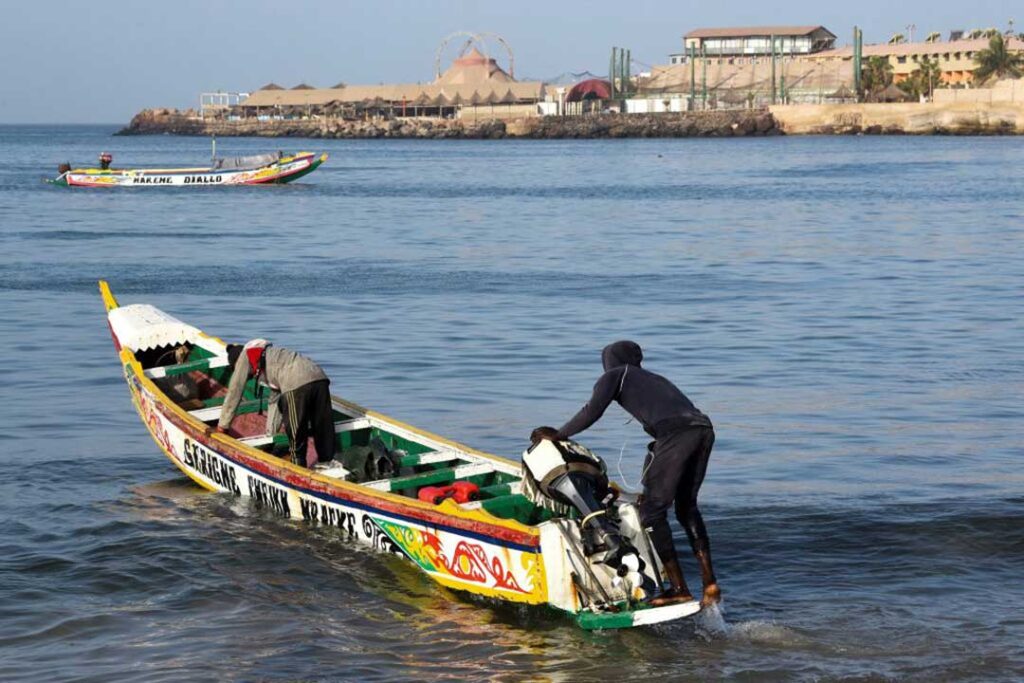ADF STAFF
Roughly 12.3 million people work in Africa’s fisheries and aquaculture sector, but their livelihoods are compromised by rules that favor large foreign fleets.
According to an analysis published by The Conversation Africa, many coastal countries have enacted regulations that allow foreign distant-water fishing (DWF) fleets to fish in areas where fish stocks are in steep decline.
Many DWF fleets engage in illegal, unreported and unregulated (IUU) fishing. In West Africa, long targeted by China’s DWF fleet, it’s estimated that IUU fishing hauls in a catch equal to 40% to 65% of the size of the legally reported catch. Some countries have expanded areas for industrial fishing and reduced the areas designated for artisanal fishermen, even as they attempt to fight IUU fishing.
A lack of maritime law enforcement capacity and opaque agreements with foreign fishing companies further threaten the livelihoods of small-scale fishermen, fish processors, farmers and sellers around the continent.
“The marine fisheries sector is under threat due to these unsustainable rates of fishing, and also because of weak fisheries governance,” wrote researchers Ifesinachi Okafor-Yarwood and Edward Allison in The Conversation Africa. “Fisheries governance measures in Africa are largely constraining small-scale fishers, while failing to contain the industrial fisheries sector.”
Works in Progress
Some countries are trying to fix the imbalance.
In December 2021, Benin, Ghana and Togo signed an agreement to enhance monitoring of the countries’ fisheries and share maritime information supplied by the Regional Monitoring, Control, and Surveillance Center in Ghana, SeafoodSource reported. Illegal marine trade costs West Africa almost $1.95 billion across the fish value chain and $593 million per year in household income.
Mavis Hawa Koomson, Ghana’s minister of fisheries and aquaculture development, announced in September 2021 that the country is reevaluating laws and policies that regulate its fishing sector and reviewing its National Fisheries and Aquaculture Policy.
The efforts “are to ensure that the management of the fisheries resources meets emerging trends in fisheries management and international best practices,” Koomson said in a story by Ghanaian news website Myjoyonline.com.
Despite Ghana’s efforts, The Conversation Africa analysis revealed that some regulations are hurting artisanal fishermen. The industrial fishing sector must observe a two-month closed season, while the artisanal sector observes a one-month shutdown.
The aim was to preserve fish stocks, but critics say the action led to increased household hunger and a lack of dietary diversity.
In 2020, Liberia embarked on a four-year, $3 million project designed to aid local fishermen in their battle against IUU fishing. The Communities for Fisheries project will train local fishermen to take geotagged photos of trawlers suspected of IUU fishing. It is a partnership between the Environmental Justice Foundation and Liberia’s National Fisheries and Aquaculture Authority.
Also in 2020, Liberia denied fishing licenses to six Chinese supertrawlers capable of decimating the area’s fish stocks. The 50-meter-long vessels with huge nets and sophisticated fish-tracking equipment can catch more than 2,000 metric tons of bottom-dwelling fish annually. That is 4,000 times more than a local artisanal canoe can haul in, according to SeafoodSource.
Limited Fishing Areas
Liberia, Madagascar and Somalia have reduced the areas where artisanal fishermen can fish and expanded zones for industrial trawlers.
In Madagascar and Somalia, the industrial fisheries sector is expanding through access agreements and licenses to DWF fleets linked to the European Union and China, the analysis showed.
But both countries are still trying to battle IUU fishing.
In September 2021, Madagascar announced that it had officially requested to enter the Fisheries Transparency Initiative (FiTI), according to a report on blueventures.org. FiTI aims to collect and make public reliable data related to fishing, including the number of vessels licensed to fish in a country’s waters, catch data, information about the sustainability of fish stocks, and the economic value from various forms of fishing and fish processing.
“This is a major step towards the preservation, management and development of sustainable fisheries for future generations,” Madagascar’s Ministry of Fisheries and Blue Economy said in a statement. “Joining the FiTI will allow us to improve delivery of public services, enhance transparency for responsible fishing and promote collaboration between all stakeholders in the fisheries and blue economy sector.”
After years of declining pirate attacks in Somalia, fishing fleets, mostly from Iran and Yemen but increasingly from China, have returned to the waters, making IUU fishing a major challenge that costs the country millions of dollars a year.
In July 2021, Somalia produced a draft law aimed at strengthening its fishing licensing processes to enhance transparency and close loopholes that allow overfishing.
Somalia has drafted a new fisheries law that will address gaps in the federal power-sharing system and fisheries management, while also dealing with corruption, license systems and environmental protection, said Mohamud Sheikh Abdullahi, director-general of Somalia’s Ministry of Fisheries, according to a SeafoodSource report. “We are also strengthening the intergovernmental coordination within our country and with other maritime agencies.”

